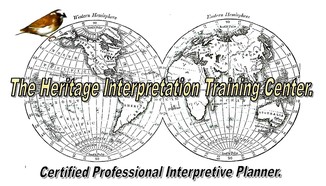John Veverka & Associates
Main menu:
- Home Page
- Our Range of Services
- Interpretive Coaching
- Interpretive Planning
- Interpretive Plan Outline
- Interpretive Training
- John Veverka Resume
- NEW Advanced Interp. Text Book
- InterpNEWS
- Library
- JVA NEWS, Courses and Updates
- Certificates
- Planning/Design of Interpretive Panels
- Interpretive Writing
- Interpretive Writing Course
- Interpretive Trails Course
- Interpretive Panels Course
- Introduction to Heritage Interpretation Course
- Interpretive Planning & Design of Marketing Brochures Course
- Training for Interp. Trainers
- Interpretive Exhibits Course
- Interpretive Master Planning Course
- Interpretive Planning for Scenic Byways.
- Critiquing and Coaching Interpretive Staff
- Advanced Interpretive Planning
- Interpretive Training Center Course Catalogue
- Interp. for International Visitors course.
- Interpretive Exhibits Evaluation
- Interp. Center Feasibility Analysis Course.
- Interp. for Commercial Tour Providers
- Interpretive Researchers Guide for Visitor Studies
- Interp. Planning for Historic Homes
- Heritage Interpretation Training Center
- Interpretive Planning for Botanical Gardens
- An introduction to planning and presenting live interpretive programs and tours for Museum/Heritage Site Docents and Volunteers.
- Developing Marketing Plans for Heritage & Tourism Sites and Attractions
- Interpretation Book Store
- Heritage Interpretation Resource Center
- Interpretive Planning for Historic Farms
- Developing Successful Partnerships
- Developing Interpretive Outreach Programs
- Community Interpretation Planning
- Interpreting Gravestones and Historic Cemeteries
- Using Interpretation to Accomplish Management Objectives.
- An Interpreters Guide for Survival Economics.
- Innovative Strategies for Interpretive Media and Services Planning.
- A Curators Guide for Developing Gallery Tours.
- Advanced Interpretive Writing - Technical Publications
- Advanced Interpretive Services for Managers, Supervisors, Team Leaders and Sr. Staff.
- Advanced Interpretation for Chiefs of Interp. - Interpretive Managers - Regional Interp. Specialists
- Interpreting Critical Issues.
- Developing Commercial Interpretation for Resorts, Cruise Ships, Campgrounds and Tourism Attractions.
- Planning and developing a new commercial tour guiding business.
- Interpretive Evaluation, Visitor Studies and Site Assessment Center
- The Center for Interpretive Planning Advancement & Excellence.
- Developing Requests for Proposals (RFPs)
- Planning and Facilitating Focus Workshops
- Planning for Interpretive Experiences
- 40 Years a Heritage Interpreter
- Interpretive Techniques - The Rest of the Story Course
- Certified Professional Interpretive Planner Certificate
- Certified Professional Interpretive Program
- Certified Professional Interpretive Writer certificate program.
- Visitor motives for attending interpretive programs.
- Exhibit Rehab Course
- Developing Training Workbooks & Manuals
- Planning for Railroad Museums and Sites.
- Climate Change Interpretation Course.
- When there's nothing left but the story - interp. storytelling.
- Interpreting Legends Myths and Fables
- InterpSHARE - Seminars 2022
- Interpreting Invasive Species
- Interpretiing Edible Insects
- Interpretaive Planning for Climate Change
- HITC Climate Crisis Resource Center
- PUP Members Only
- Starting a new Interp Consulting Business
- Panels 4 Week Course
- Interpretive Writing - 4 Week Course
- Marketing - 4 Week Course
- Intro to Interpretation - 4 Week Course
- Interp Climate Change - 4 Week Course
- Exhibit Rehab 4-Week Course
- Level 1
- Johns Interpreters Blog
- John Interpreters Blog 2
Certified Professional Interpretive Planner Certificate

The Heritage Interpretation Training Center is pleased to offer the first of our "Certified Professional" Interpretive Training Certificates,
our
Certified Professional Interpretive Planner Certificate.
While other organizations offer certified interpretive planner or related certificates, our Certified Professional Interpretive Planner Certificate is far more content extensive, university level, and more in-depth than any of the other interpretive certificates. It offers more current content, hands-on learning experiences, and direct content with the Certificate Manager/Trainer and Coach throughout your Certification experience.
Our Certified Professional Interpretive Planner Certificate is:
- Taught and coached by professional interpretive planners with 40 years of actual interpretive planning experience, as well as years of teaching interpretive master planning courses. This includes developing and teaching a course on interpretive master planning at the Ohio State University and teaching introductory and advanced courses in heritage interpretation at Michigan State University.
- Based on a University Course Outline system consisting of completing nine (9) actual courses in interpretation, not just taking one course, one test and mainly paying the course fee. The Certificate courses are offered in content sequence leading up to the final course in developing your interpretive master plan.
- Awards CEU (Continuing Education Unit credits for the Certificate Program (and each individual course that is offered as part of the Certificate Program.
About the Instructor: Prof. John Veverka
Error File Open Error
(Interpretive planning in Saudi Arabia, 2017). Community Interpretive Planning Training, Columbia, SA (right).
- B.S and M.S in Heritage Interpretation - The Ohio State University
- Ph.D. program in Interpretation at Michigan State University.
- Adjunct Professor Heritage Interpretation (summer heritage tourism institutes) North Carolina State
University,
- New York State University. Adjunct Professor, Heritage Tourism Institute.
- NAI Certified Interpretive Planner and Trainer
- NAI Fellow
- Certified Professional Heritage Interpreter (Canada).
- Author of several interpretive planning/training college text books.
- Publisher of InterpNEWS - the International Heritage Interpretation e-Magazine.
- 40 years of interpretive planning, training and writing experience.
- Director, The Heritage Interpretation Training Center
Required courses as part of the Certificate completion:
Introduction to Heritage Interpretation Course. 14 Units - 2 CEU credits. A review of interpretive basics in case you never had a college level course in interpretive principles, practices or theory.
http://www.heritageinterp.com/introduction_to_heritage_interpretation_course.html
Interpretive Writing e-LIVE Course - 8 Units and 2 CEU Credits - Interpretive planners do lots of writing, not only the interpretive plan itself, but writing for interpretive panels, exhibits, brochures or other interpretive media.
http://www.heritageinterp.com/interpretive_writing_course.html
Planning/Designing Interpretive Panels e-LIVE Course - 10 Units awarding 1.5 CEU Credits An interpretive planner needs to know all about interpretive media that they will be recommending for placement in their interpretive plan/site or park. You have to be familiar with new panel materials, warranties, and costs before your recommend them for your interpretive plan and client. http://www.heritageinterp.com/interpretive_panels_course.html
The Interpretive Exhibit Planners Tool Box e-LIVE course - 11 Units and 2 CEU Credits. Exhibits are very expensive, and if you're going to recommend them in your interpretive plan you better know how to theme them, plan them, and cost them out. Do you know how to write a RFP for visitor center exhibits? Interpretive planners must!
http://www.heritageinterp.com/interpretive_exhibits_course.html
Planning Interpretive Trails e-LIVE Course - 13 Units - 2.5 CEU Credits. Interpretive trails are a basic for any interpretive plan for parks, natural areas and related outside interpretation. Do you know the best trail materials, lengths, maintenance needs, trail standards for construction, etc. An interpretive planner has to be up on all this.
http://www.heritageinterp.com/interpretive_trails_course.html
An Interpretive Researchers Guide for Developing Visitor Surveys and Questionnaire/Interview Designs For Natural & Cultural Heritage Sites and Attractions.
Ten Units - 2.5 CEU Credits. A key part of interpretive planning is an in-depth understand of the sites visitors, visitor seasonal use and use patterns, visitor interests, age groups, market groups, etc. You are not planning the for the park/site staff, you are planning for the park/site visitors. Have you ever had any training in this element of interpretive planning?
http://www.heritageinterp.com/interpretive_researchers_guide_for_visitor_studies.html
Innovative Strategies in Interpretive Media and Services Planning - New Conceptual Tools for Today's Interpretive Planners. Markets on One, Mass Customization, Experiential Planning and the Psychology of Visitor - Interpretive Program Topic/Mode Preferences. If you're not using these in your interpretive media/services planning and development then you're way behind the creativity curve and could be losing new visitors as well. Welcome to the new millennium for interpretive planners where "one size does NOT fit all". Eleven Units, 3 CEU Credits.
www.heritageinterp.com/innovative_strategies_for_interpretive_media_and_s.html
Interpretive Master Planning - e-LIVE. 13 Units, 3 CEU Credits. As the Interpretive Master Planning course is the "capstone" course where all of the previous concepts are pulled together to form your interpretive master plan, you may chose this main course.
http://www.heritageinterp.com/interpretive_master_planning_course.html
OR - Based on the site or project you may be working on, you may select one of the alternative Master Planning Specialty courses instead of the general interpretive master planning course:
- Interpretive Planning for Historic Homes and Gardens. 12 Units - 3 CEU credits
http://www.heritageinterp.com/interp_planning_for_historic_homes.html
-Interpretive Planning for Botanical Gardens and Arboretums. 11 Units - 3 CEU credits,
http://www.heritageinterp.com/interpretive_planning_for_botanical_gardens.html
-Interpretive Planning for Historic Farms and Agricultural Sites 13 Units - 4 CEU credits,
http://www.heritageinterp.com/interpretive_planning_for_historic_farms.html
The "final exam" for the Certified Professional Interpretive Planner certificate is you submitting a working draft of an interpretive master plan you have been working on. Products speak louder than words. You can also submit a recently completed interpretive plan your done with a "critique" of the plan, what you think you did well, what you now know you coud improve on do do differently.
While there is a recommended sequencing of courses, just as with any university degree program, from introductory to more advanced courses, depending on your own background and training/experience, you are allowed to undertake more than one course at a time. It is estimated that the average time needed to complete all the required courses, would be approximately 10 months. All the individual courses are "work at on your own pace" and as fast or as slow as you need to.
All individual courses and units include:
1. YouTube video instruction for each individual course unit.
2. Interpretive text books (e-books) and reference materials.
3. Reading assignments and materials.
4. Homework assignments to be sent directly to the course certificate manager.
5. You may chat with, call or SKYPE with the course coach as needed - you have a LIVE
instructor. This is NOT an "internet-only" course.
Upon Completion of the Certified Professional Interpretive Planner certificate course, you will receive:
- Twenty (20) CEU unit credits.
- A certificate of completion and Certification Pin.
- A Certification Logo for you to use on your web site or other electronic media.
- A cover letter listing all the courses you have completed as part of the Certification program.
- A listing of your name on our new Certified Professional Heritage Interpreter web site with a
link to your e-mail or web site (as desired).
Note: unlike other certifications, you will NOT have to do everything over again in four years. This is a lifetime Certification.
Certified Professional Heritage Interpreter certification course: Cost: $1500.00
Note- the tuition cost includes eight (8) individual interpretive courses, One-on-One interaction and coaching with the Certificate Manager/coach. All text books and reference materials, and individual consultation on your interpretive planning project as needed.
If you would like to sign up for our Certified Professional Interpretive Planner certificate, you have three options to pay the Certification tuition via PayPal or credit card
One lump-sum payment (a savings of over $500.00 if these courses were taken separately),
$1500.00,
OR
Two seperate payments of $750.00 each.
Payment One - Certification program start-up. $750.00
Payment Two - Final certification program for completion due ½ way through the
certification program. $750.00
-----------------
You can start the course as soon as the certification payment is received. Prior to starting the course you are encouraged to chat with the course manager, John Veverka, to provide academic advising for you on the courses and course sequences, or answer any questions you may have.
John Veverka
Certified Professional Interpretive Planner
Certified Professional Heritage Interpreter
Director, Heritage Interpretation Training Center
jvainterp@aol.com